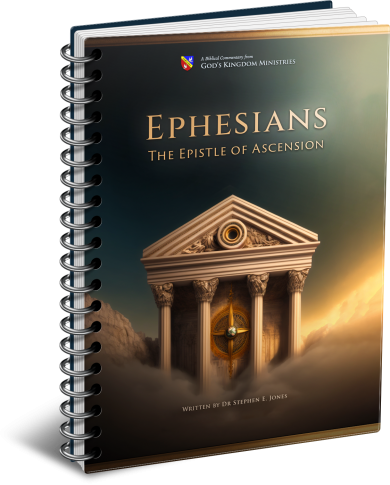Many people say that God must judge sinners because He is holy and will not allow any sinner to come into His presence. God is indeed holy, but we read in Job 1:6 says,
“Now there was a day when the sons of God came to present themselves before the Lord, and Satan also came among them.”
Instead of casting Satan out of His presence, God carried on a conversation with him. Apparently, God’s holiness did not mean that Satan was forbidden to approach God.
So perhaps we ought to base the judgments of God upon something more than just His holiness. 1 John 4:8 says, “God is love.” Perhaps this should be our starting point when considering God’s judgments for sin.
Jesus said that God’s law could be summed up this way in Matt. 22:37-39,
“‘You shall love the Lord your God with all your heart, and with all your soul, and with all your mind.’ This is the great and foremost commandment. The second is like it, ‘You shall love your neighbor as yourself.’ On these two commandments depend the whole Law and the Prophets.”
Love, then, is the basis of “the whole Law.” If any law appears to be unloving, it is because we have not understood it properly. Each law gives us another way to show love to our neighbors. That is why there are laws against theft, murder, lying, adultery, and coveting. None of these things are a genuine expression of love, because such sins always violate the rights of others.
Even the judgments of the law are based on love. Each judgment is designed to restore what the victims have lost. Each judgment is also designed to correct the sinner who has violated his neighbor’s rights. The law is a referee between God’s children, and it trains them to be good citizens of the Kingdom of God.
The Law Defines Sin
The laws of God were meant to show us the nature of the God of love. Anything contrary to His nature is sin, and any time a person violates God’s law, he fails to live up to the potential that God created him to achieve. God’s plan is to bring all mankind to their full potential.
The Apostle John wrote a letter (1 John 3:4), telling us that “sin is lawlessness.” He used the Greek word anomia, which is derived from nomos, “law.” It was the same word Jesus used in Matt. 7:23, speaking of those who thought they could ignore God’s law as long as they performed miracles in Jesus’ name. Jesus said,
“And then I will declare to them, ‘I never knew you. Depart from Me, you who practice lawlessness.’”
“Lawlessness” is the attitude or belief that we may act as if there is no law, no standard of behavior that we must follow. Lawlessness despises the law and treats it as if it is irrelevant or outdated. But because the law is rooted in love, lawless people end up doing unloving things.
Often, they do not realize this, because they follow their own standard of love. When they do what they think is right, rather than what God says is right, they will inevitably fail to live according to perfect love. Man’s conscience is shaped largely by man’s imperfect culture, so conscience needs to be re-educated by God’s word.
The Apostle Paul wrote in Rom. 3:20, “through the Law comes the knowledge of sin.” Again he says in Rom. 7:7,
“I would not have come to know sin except through the Law; for I would not have known about coveting if the Law had not said, ‘You shall not covet.’”
Paul’s conclusion is found in Rom. 7:31,
“Do we then nullify the Law through faith? May it never be! On the contrary, we establish the Law.”
Paul agreed with Jesus, who said in Matt. 5:17 and 18,
“Do not think that I came to abolish the Law or the Prophets; I did not come to abolish, but to fulfill. For truly I say to you, until heaven and earth pass away, not the smallest letter or stroke shall pass away from the Law, until all is accomplished.”
So the idea that the Law of God was put away or set aside did not come from John, Paul, or even Jesus. It came from those who did not want to love others according to God’s standard. They preferred their own definitions of love—or perhaps they thought that the Law of God failed to reflect His true nature. Either way, they were wrong and have misled many Christians into being lawless or adopting a lawless belief system.
When Christians reject the law of God, they soon lose the revelation of God’s love. This is especially seen in their views of divine judgment. This was how the idea of an eternal punishment in a burning “hell” came to be taught. The churchmen forsook the merciful law of God and substituted their own very unmerciful judgment.
They took the biblical metaphor of fire and turned it into a literal, infinite, and fiery punishment.
All Judgment is Limited
The Bible limits judgment in two important ways. First, for misdemeanors judgment is limited to forty lashes with a whip. Deut. 25:3 says,
“He may beat him forty times but no more, lest he beat him with many more stripes than these, and your brother be degraded in your eyes.”
Although forty lashes is a severe punishment, it does not last forever. Most people would not receive a maximum sentence, of course. The severity of judgment would depend upon the severity of their offense.
The other great law that limits divine judgment is the law of Jubilee. When a sinner committed a sin that was so great that he did not have enough money or property to pay restitution, he was to be “sold for his theft” (Exodus 22:3). In other words, he was to be enslaved, or put under someone’s authority until the debt was paid.
The trade-off was that his new master took the responsibility upon himself to pay the debt owed to the victim of the crime. The sinner then had to reimburse his master by working off his debt for a period of time.
This time of enslavement was imposed upon the sinner by the law, and if the sinner refused to work off his debt, the law would enforce it. As long as the law had an interest in the case, the sinner was said to be “under the law.” When the debt was fully paid, then the sinner was no longer under the law, but “under grace.”
Grace means that the law has been satisfied and that the debt has been paid. The sinner is set free from slavery, but he is not free to sin some more. Grace is not a license to sin. Grace is a debt-free condition. So the Apostle Paul asks in Rom. 6:1, 2, “Are we to continue in sin that grace might increase? May it never be!”
The Law of Redemption
The law of redemption gives a relative the right to pay the debt of a slave (Lev. 25:48, 49). The redeemer has this right, even if the other slave master does not want to sell his slave. The redeemed slave is then indebted to his relative and is obligated to work for him (Lev. 25:53), unless his relative decides to cancel the debt altogether.
Jesus was our Redeemer, and He paid the debt for the sin of the world. He qualified as our kinsman redeemer, because Heb. 2:11 says that all of us “are all from one Father; for which reason He is not ashamed to call them brethren.”
Again, in Heb. 2:14 we read, “since then the children share in flesh and blood, He Himself likewise also partook of the same.” If you are flesh and blood, then Jesus is your kinsman and He has the lawful right to redeem you. I believe that includes the whole world.
So Jesus purchased us as His slaves, and He has the lawful right to expect us to serve Him. That is why even the Apostle Paul calls himself “a bond slave of Jesus Christ” (Rom. 1:1). He claimed to be a redeemed slave.
It is also the right of any creditor (including redeemers) to forgive any debt owed to them. That is what Jesus did at the cross when he forgave humanity for their sin. His forgiveness is real, but He still requires us to serve Him in order to learn of His ways. This is how He changes our hearts so that we may become children of love.
The Law of Jubilee
When a man was sentenced to slavery on account of debt, his sentence was limited by the law of Jubilee. No matter how much debt he owed, the law says that he must be set free in the year of Jubilee.
The year of Jubilee was the fiftieth year on the Hebrew calendar. The calendar was divided into seven-day weeks and seven-year agricultural cycles. Every seventh day the people were given a rest day, and every seventh year the land itself was given a rest.
In addition to this, every seven sevens (49 years) there was a Jubilee year in the fiftieth year. That year was also the first year of the next 49-year cycle, so the Jubilee occurred every 49 years. The law says in Lev. 25:10,
“You shall thus consecrate the fiftieth year and proclaim a release through the land to all its inhabitants. It shall be a year of Jubilee [jubilation, rejoicing] for you, and each of you shall return to his own property, and each of you shall return to his family.”
All remaining debts were cancelled, and the slaves were set free to return to the property that they had lost because of their debt. No debt was so great that it could not be forgiven in the year of Jubilee. That is the law.
While this law had application in the nation of Israel, it was ignored. They never actually kept a Jubilee, because they disagreed with God’s merciful law. The same lack of love and mercy is evident in many churches today.
Only a few churches believe that there will be a Jubilee at the end of history, where the sin-debts of all men will be cancelled. Few believe that all will return to their inheritance that was theirs before the sin of Adam caused everyone to be enslaved by sin.
Yet the law will be fulfilled, for it reveals the divine plan for the earth. Sin is reckoned as a debt, and all debts will be cancelled in the end, purely by grace. The law of Jubilee is the law of Grace. It imposes a limit on divine judgment, because this is a reflection of the love of God. His judgments come out of His heart of love.
In order for God to truly be holy, He must be true to Himself and to His love.
That is why it is important to know that the Bible speaks of eonian judgment but never “eternal punishment.” Never-ending judgment without forgiveness is a violation of God’s law and an affront to His love.
If you believe God’s promise to save the world, and if you believe that God is able to save you specifically, then this is evidence that His promise is already being fulfilled in your heart. Now you can get to know Him as your Redeemer and as your Jubilee.



